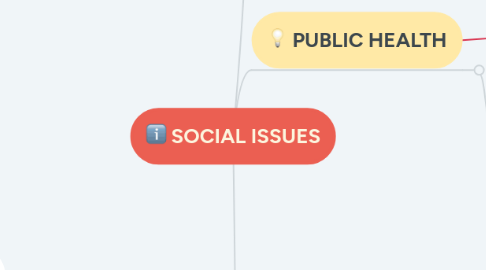
1. ENVIRONMENTAL RACISM
1.1. Environmental racism criticizes inequalities between urban and exurban areas after the white flight. Internationally, environmental racism can refer to the effects of the global waste trade, like the negative health impact of the export of electronic waste to China from developed countries.
1.1.1. Lack of mobility
1.1.1.1. Can be a symptom of many ailments, including lower back pain and arthritis.
1.1.2. Lack of political power
1.1.2.1. Can actually make you sick.
1.1.3. Climate change
1.1.3.1. As the climate has changed progressively over the past several decades, there has been a collision between environmental racism and global climate change. The overlap of these two phenomena, many argue, has disproportionately affected different communities and populations throughout the world due to disparities in socio-economic status.
2. CORRUPTION
2.1. A form of dishonesty or criminal offense undertaken by a person or organization entrusted with a position of authority, to acquire illicit benefit or abuse power for one's private gain.
2.1.1. Low levels of education
2.1.1.1. A state where people have a below-average level of common knowledge about basic things that they would urgently need in their daily life. For instance, this could include basic knowledge in math, writing, spelling, etc.
2.1.2. Poverty
2.1.2.1. It means that the income level from employment is so low that basic human needs can't be met.
2.1.3. Lack of commitment to society
2.1.3.1. It’s always nice to be involved in a relationship, and in our society today there are many relationships that we are exposed to. We have friendships, business acquaintances, boyfriends, girlfriends and marriages; we even have relationships with our pets.
3. PUBLIC HEALTH
3.1. Public health aims to improve the quality of life through prevention and treatment of disease, including mental health. This is done through the surveillance of cases and health indicators, and through the promotion of healthy behaviors.
3.1.1. Implementing effective improvement strategies
3.1.1.1. To improve public health, one important strategy is to promote modern medicine and scientific neutrality to drive the public health policy and campaign.
3.1.2. Applications in health care
3.1.2.1. As well as seeking to improve population health through the implementation of specific population-level interventions, public health contributes to medical care by identifying and assessing population needs for health care services.
3.1.3. Public health programs
3.1.3.1. the importance of public health programs in reducing the incidence of disease, disability, and the effects of aging and other physical and mental health conditions.

